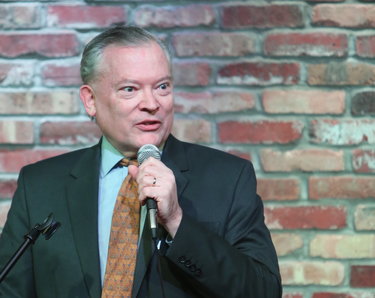‘Federal chaos’ causes local uncertainty and fear, leaders say
GUILDERLAND — Local leaders voiced concerns on Wednesday morning about the effects the first few weeks of Donald Trump’s presidency are having here.
“What’s happening in Washington is spooky at best,” said Guilderland Supervisor Peter Barber as he addressed the crowd at the “Meet Your Representatives” event hosted by the Guilderland Chamber of Commerce.
In addition to Barber, the speakers included the school superintendent, the county executive, a state senator, two assembly members, a congressional staffer, and two county legislators. One of the county legislators, Mark Grimm, is Republican; all of the other elected officials who spoke at the FunnyBone Comedy Club in Crossgates Mall Wednesday morning are Democrats.
Among the usual updates at the annual event, apprising listeners of the past year’s progress and plans for the year ahead, Wednesday’s session had a common thread, addressing the local upheaval coming from the Trump administration.
“It’s a global economy and we’re being impacted,” said Barber. Referring to the town’s ambulances, which cost upwards of $350,000, he said, “I have no idea what might happen if we have a trade war in Canada because our chassis are built in Canada.”
He was referencing the president’s Feb. 1 signing of executive orders placing tariffs on Canada, Mexico, and China. Donald Trump later postponed the tariffs on Mexico and Canada after those countries promised to do things they were largely already doing.
The 10-percent tariff on Chinese goods is currently in effect.
Congressman Paul Tonko’s staffer, Manik Elahi, told the crowd, “We are currently living through a reality in Washington, which is uncertain — and that’s just a factual statement — where we have businesses, workers, business owners, operators, managers who are uncertain about the future, and, if there’s one thing businesses hate, it’s uncertainty.”
Some outlets are calling the Chinese tariffs “the dumbest trade war in history,” he said. “I want to emphasize the fact that these are having real impacts in our community.”
Elahi went on to tell of a hardware-store owner, with “very, very thin margins to begin with,” who, because of the tariffs, has to either “pull products off the shelf” or make the “painful decision to raise her prices.” He noted, “We’re all consumers.”
He went on, “The impacts of this is affecting real people at the grocery store, at the shelves of hardware stores across this country.” He urged listeners to “use our office as a resource” and said, “There’s a fight to level the playing field for working families, for working people, for consumers, and for business owners and operators.”
Barber said the town got calls from worried people after Trump, on Jan. 27, paused federal grants and loans that had frozen trillions of dollars, leading to mass confusion and legal challenges. Two days later, Trump rescinded the directive but proceeded with a review to eliminate spending on “woke” ideologies.
Barber characterized the original directive as saying, “Hey, we don’t need Social Security, we don’t need Medicare, we don’t need Medicaid.”
Barber went on about the federally subsidized housing in Guilderland, “What about Section 8 …. I have 186 residents in our town, including 44 children, who depend on House Choice support. We got calls from those people. They’re worried. They’re panicking about what happens. I have landlords who have to pay mortgages, they have to pay expenses. And it was a real concern because it was not a direct payment.”
Barber went on, explaining a bit about how the Section 8 housing works; families in the program pay rent capped at 30 percent of their income with the government making up the difference.
“You have basically people who are workers. They contribute, there’s a percentage …,” said Barber. “I have to sign off on it and you see there’s children, there’s people, they’re workers. They’re working in our community.”
Barber concluded, “I think people may not understand that what’s going on in Washington 450 miles away from here can really impact, you know, what’s happening in our town. Again, I try to be as transparent as I can.”
State Senator Patricia Fahy said the legislature is just at the start of the budget process. “Uncertain, unprecedented, unstable times is an absolute understatement,” she said. “I commend Supervisor Barber for bringing this down to the real level,” she said.
“‘Spooky’ is a great word,” she went on. “I, too, am alarmed. We may be facing international wars … The announcements each day continue to shock and awe … I don’t see how any of this is going to bring down the price of eggs.”
Of creating New York’s budget, Fahy said, “The two biggest drivers on the state budget are education and health care. So, if we see Medicaid funding disappears, if we see education funding, including the entire U.S. Department of Education, disappear, I don’t know how you backfill that.”
Fahy also said that “tariff threats and the tariff implementation with China” will further raise the cost of building materials in the midst of “a national housing crisis.”
She went on, “We are clearly about to go backwards on energy and the environment.” Fahy noted the increase of “extreme weather patterns,” playing out in Guilderland in the repeated flooding of Western Avenue.
“So you pay one way with what used to be called natural disasters — nothing natural about these extreme weather patterns —” or you pay another, Fahy said.
Fahy concluded, “I’m completely stunned each night trying to keep up with the news and extremely worried about what is happening, not just with our trade partners but now internationally what we may face — the idea of occupying the Gaza strip is just completely the opposite of what we heard in this election and sending our troops overseas is just stunning.”
On Feb. 5, top administration officials tried to soften elements of Trump’s proposal to force Palestinians out of the territory and take it over as experts said the plan would violate international law.
Assemblyman Phil Steck said he’d met with Cummins Inc., which has a service center in his district on Railroad Avenue.
At the end of the “excellent meeting,” Steck reported, “They say, ‘Well, like all manufacturers in America, some of our parts come from other places and the Trump tariffs are going to increase our cost and a lot of Cummins equipment is utilized by the state’ …
“And they said, “We need relief from our state contracts because of the Trump tariffs.’ And I said, ‘Here’s your relief: Vote Trump out. You’ve got to take the bitter with the sweet … You can’t have a disruptor and then call on the state to insulate you from that.’”
Steck also reported on the state budget, “If the federal aid is undone in any respect, all the promises of the governor in the budget aren’t going to be there at the end.”
Assemblywoman Gabriella Romero, who took office in January, said she has been focusing on “constituent relations.”
She has scheduled upcoming listening sessions at the Voorheesville and Altamont libraries and plans to open a permanent office in Guilderland across from where the new Costco warehouse is slated to be built, she said.
Meanwhile, she has been hearing from constituents because of the “federal chaos,” Romero said.
“People have been talking to us a lot about the executive orders and the immigration-related consequences,” she said. “People have been talking to us about the uncertainty … the scariness. People are afraid, especially in the AAPI [Asian American and Pacific Islander] community, in the Hispanic and Puerto Rican community.”
Her office has been working with the Hispanic caucus and other organizations to do “know your rights” presentations, Romero said.
“We’re working in that way to make sure that we’re engaging in our constituents because that is a very scary concept to many people and, when those executive orders came in, when that news came in, our office was flooded and we were getting tearful constituents coming to us and, for me, as a new member, that was very scary. I wasn’t expecting that.”
Albany County Executive Daniel McCoy said Albany County is home to 1,500 immigrants. McCoy said he is pleased that criminals are being deported and said the immigration system in the United States has been broken for generations.
“It needs to be fixed,” he said.
McCoy also urged, “Stay calm … We’ll get through it.”
Sandra Dollard, who directs the chamber of commerce and hosted the event, said she works with “fantastic” interns who are students at Guilderland High School.
“None of them were born in the United States,” said Dollard. “They are now United States citizens and they and their community are very scared right now.”
Marie Wiles, superintendent of the Guilderland schools, noted that the word “uncertainty” had been heard frequently in the course of the morning’s speeches.
What school districts want and need, she said, is “predictability and sustainability.”
She concluded her report on the district’s recent progress and future plans by inviting listeners to attend the upcoming musicals at the high school and middle school.
“In times of uncertainty, in times of worry, this will make your day,” said Wiles.



